With three hours to go to the announcement of the winner, the competition is in full swing, I meet juror Matteo Baronetto. I ask him how it’s going. «I can say nothing, Carlo. For sure, all four of them are good and well prepared, but I feel like one of them is more of a cook than the others». That is to say? «An all-round cook». Capable of not going off topic (Bocuse d’Or requires some specific parameters to be followed), of showing technical skills, and of giving a magic alchemy of elegance and structure and most of all of taste, a feature that in some cases was missing, as we later learnt.
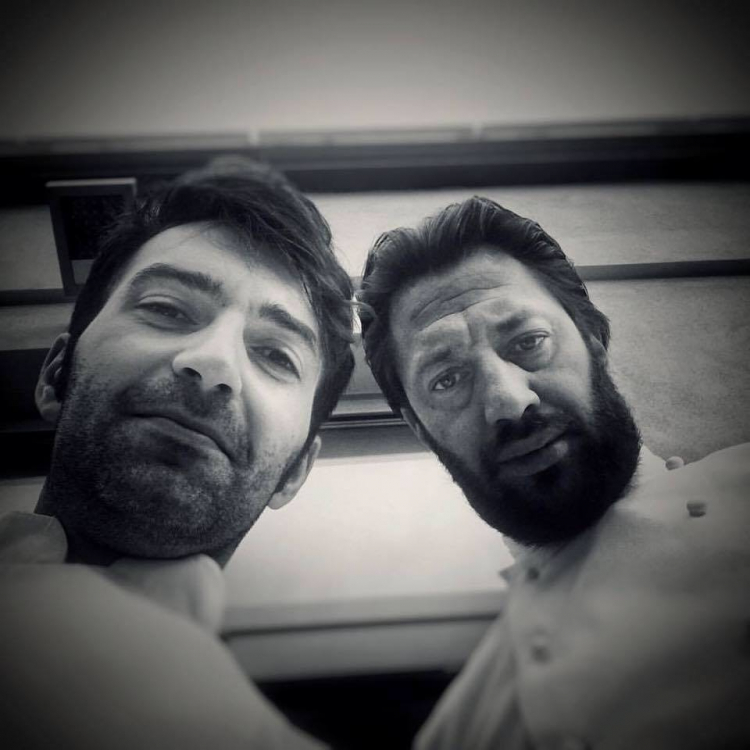
Martino Ruggieri with coach Luigi Taglienti
I don’t know to whom the chef from
Del Cambio was referring; for sure I remembered it a little later after the crowning of
Martino Ruggieri (here’s the news of the result:
Martino Ruggieri vince il Bocuse d’Or Italia 2017) as winner and Italian representative in the European finals of the
Bocuse d’Or, in Torino in June. This because even others told me the same.
Luigi Taglienti for instance, who was in fact
Ruggieri’s coach: «It was a cook that won. Someone who cooked. He brought ideas, identity, creativity but most of all taste». A little further there’s another concentration of deliciousness, with
Nicola Portinari,
Peppino Tinari,
Angelo Sabatelli,
Fic president
Rocco Pozzulo (all in the jury) plus special guest
Luca Abbruzzino.
In unison they give me a sort of shared statement: «Some overdid it, some paid too attention to technique, looking for useless complexity. The person who knew how to work as a cook, prevailed by far». The winning team also included Curtis Clement Mulpas, who won the best commis award. A final comment by Sabatelli, teasing Abbruzzino jr: «After the age of 30, you realise you must simplify. After 40, you do it». A few minutes earlier, I met another important juror, Accursio Craparo: «Technique is fine, but what happens if you forget taste?».
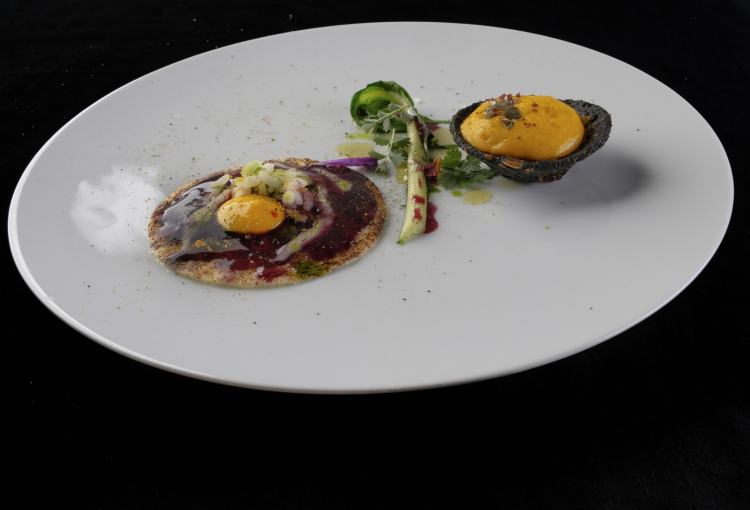
Ruggieri’s dishes. The vegetal one La sublimazione è nel viaggio. Puglia, Italia, Mondo, is thus described: "My Apulia is a land of conquest. From the Arabs to the Normans, and recalled as a cradle of Magna Graecia. A babel of cultures, spices and vegetables with overlapping origins, but with a universal language, hospitality. This dish goes beyond discriminations, it puts together northern avant-gardism and the many facets of the south. One beside the other, in a mix of techniques and colours, with the wish of keeping tradition, history, origins alive, making the complexities in the dish accessible"
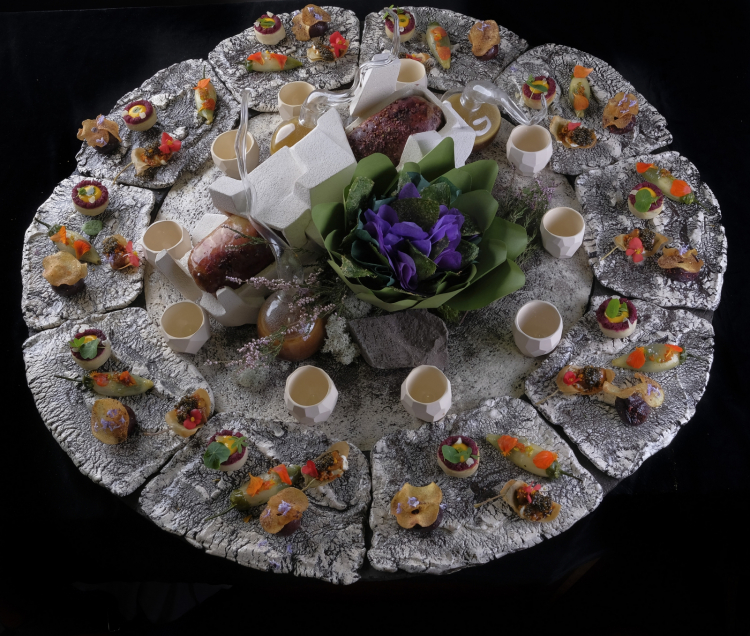
The meat dish is Il Trullo, here’s the description: "Symbolism and e synaesthesia in the post-modern interpretation of a trullo, the umami in Apulian architecture. An ash black base recalls the mysticism of the cone, which in this meat dish holds a matter that changes state and becomes a feeble blood trace in the sauce and the sound foundations of the garnish. Frailty and certainty, the baggage of any traveller. Peppers, figs, powdered pine, broad beans, onions and beetroot, that is to say the history of Apulia enclosed in the mysticism of a magic circle recalling the ancient use of cooking on terracotta in the most ancient countryside tradition"
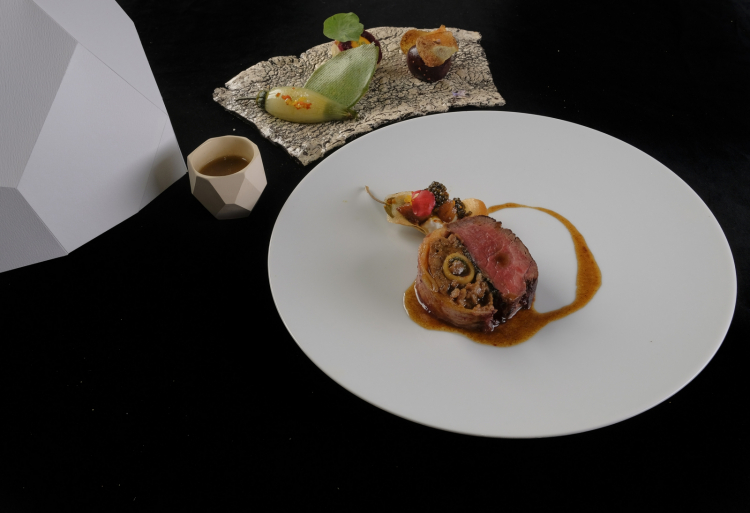
The out-of-proportion meat dish
So the crown is well deserved:
Martino Ruggieri was first – this is the news – but most of all he’s shown he’s a real cook (nobody ever mentioned the word chef, and
Gualtiero Marchesi will be happy). After all, his brief biography on the
Bocuse d’Or Academy website, the organisers of the event in Alba, already gave a hint of this: “Currently
deputy head chef at three-starred
Pavillon Ledoyen in Paris [with
Yannick Alléno],
Martino Ruggieri’s CV is of the highest standards, with experience at
La Pergola with
Heinz Beck and
L’Atelier de Joel Robuchon in Paris. In his culinary project an international feature strongly stands out, applied to the products of his homeland, Apulia, where he emphasizes the flavours of the past with very original recipes”.
A flattering portrait, so I ask Taglienti what he recommended to his pupil, in these weeks of coaching: «Just one thing: create your recipes based on Italian flavours». Did he do it? «Indeed. Martino made food you can eat». It may seem nothing, it’s everything.
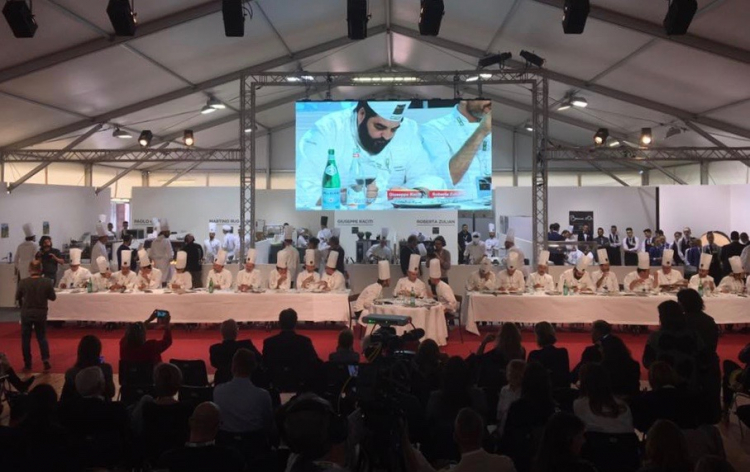
The jury of the Bocuse d'Or
Italian food. With a strong reference to Apulia:
Ruggieri was born in Martina Franca in 1986, «take your roots and put them in the suitcase. All you have is with you, in the space of a piece of hand luggage. I told a story of avant-garde, a journey between Apulia, Italy and the world, often with Sirocco affecting mood and smells – he explained later, during the final press conference - In France the award doesn’t go to the most talented; it goes to someone who tells something true». Looks like this is what he did.
He had no intention of participating in the Bocuse d’Or until a short while ago; then he changed idea in Paris, «I learnt how important it is to take a challenge». And first of all he wondered: what is the culinary project with which I want to compete? «My answer: representing Italy. Our raw materials, our techniques, without following other schools».
Enrico Crippa, president of the Accademia Bocuse d’Or Italia and of the jury was nodding beside him: «Bravo Martino, bravo to the other three too [Paolo Griffa, Roberta Zulian and Giuseppe Raciti]. Overall, I’ve noticed a great leap in quality compared to the past, in these Italian finals. I’m very happy. Our movement is growing well. We’re here in Piedmont, but it involves the entire country».